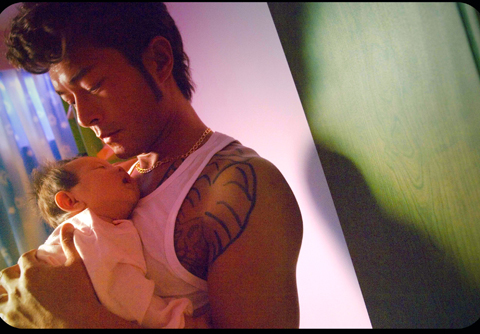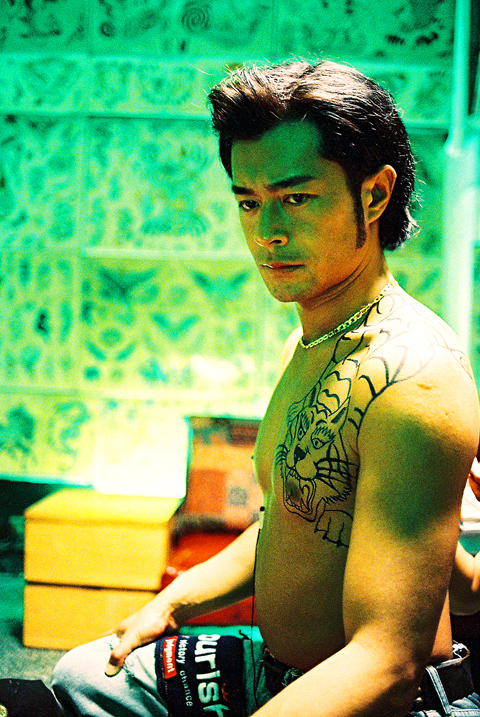An enduring staple of Hong Kong cinema, the testosterone-charged gangster flick has inspired distinctive styles and narrative forms. Under the guise of a triad movie, Run Papa Run (一個好爸爸) sees veteran Taiwanese actress and director Sylvia Chang’s (張艾嘉) take a womanly look at this male-dominated genre, revealing the tough guy’s rarely seen family side through lighthearted drama and comedy and stars the well-cast Louis Koo (古天樂) and Rene Liu (劉若英).
The film begins with a flashback to triad boss Lee’s (played by Koo) childhood in a crime-ridden neighborhood. Raised by a single mother, Lee was always on the wrong side of the law and rose from street punk to gang leader.
This bad boy meets an angelic lawyer named Mabel (played by Liu). Sparks fly, and Mabel shows up on Lee’s doorstep one day, pregnant, luggage in tow.

PHOTOS: COURTESY OF ARM FILMS
Lee’s life is turned upside down after their baby girl is born. Determined to be a good father, Lee keeps his underworld identity a secret to his daughter, while attempting to make his business legit and retire from the gang.
But things don’t go as smoothly as the Lee family had expected as the father is tapped to become the next kingpin. Lee’s first assignment as the leader is to oversee a drug deal, one that goes unexpectedly wrong.
Entertaining and well-realized, Run Papa Run shows director Chang’s competence in storytelling, with seamless editing punctuated by manga-informed graphics and special effects. As the protagonist passes from one chapter of his life to another, the film undergoes a shift of tone, from whimsical musical scenes in the beginning to a latter half that plays out like a soap opera. The final scene, where a gray-haired Koo prays in a church, however, brings the film’s uneven tone to the fore and leaves audiences hanging.

PHOTOS: COURTESY OF ARM FILMS
Most of the film’s humor comes from Lee’s attempt to maintain his double life as a father and a triad boss and hide his criminal affiliations from his daughter. Cute moments abound both in Lee and Mabel’s romance and between the dad and his baby girl. The stylish cinematography uses a palette of bright and saturated colors, and the story is engaging. Unfortunately, however, it remains true to the stereotypical gender roles of the gangster genre, where men are wild and untamed while the women are virtuous.
Known for his onscreen gangster image, Koo makes a smooth foray into the father role and shows off his comedic talent. One of Chang’s principal actresses, Liu effortlessly tackles the role of devoted wife with fairytale-like innocence.
The rare return of veteran actors to the silver screen further boosts the film’s watchability. The performances by seasoned actress Nora Miao (苗可秀) and accomplished thespians Mok Siu-chung (莫少聰) and Kent Cheng (鄭則仕) delight and conjure up memories of the good old days of Hong Kong cinema.

PHOTOS: COURTESY OF ARM FILMS

Towering high above Taiwan’s capital city at 508 meters, Taipei 101 dominates the skyline. The earthquake-proof skyscraper of steel and glass has captured the imagination of professional rock climber Alex Honnold for more than a decade. Tomorrow morning, he will climb it in his signature free solo style — without ropes or protective equipment. And Netflix will broadcast it — live. The event’s announcement has drawn both excitement and trepidation, as well as some concerns over the ethical implications of attempting such a high-risk endeavor on live broadcast. Many have questioned Honnold’s desire to continues his free-solo climbs now that he’s a

As Taiwan’s second most populous city, Taichung looms large in the electoral map. Taiwanese political commentators describe it — along with neighboring Changhua County — as Taiwan’s “swing states” (搖擺州), which is a curious direct borrowing from American election terminology. In the early post-Martial Law era, Taichung was referred to as a “desert of democracy” because while the Democratic Progressive Party (DPP) was winning elections in the north and south, Taichung remained staunchly loyal to the Chinese Nationalist Party (KMT). That changed over time, but in both Changhua and Taichung, the DPP still suffers from a “one-term curse,” with the

Jan. 26 to Feb. 1 Nearly 90 years after it was last recorded, the Basay language was taught in a classroom for the first time in September last year. Over the following three months, students learned its sounds along with the customs and folktales of the Ketagalan people, who once spoke it across northern Taiwan. Although each Ketagalan settlement had its own language, Basay functioned as a common trade language. By the late 19th century, it had largely fallen out of daily use as speakers shifted to Hoklo (commonly known as Taiwanese), surviving only in fragments remembered by the elderly. In

Lines between cop and criminal get murky in Joe Carnahan’s The Rip, a crime thriller set across one foggy Miami night, starring Matt Damon and Ben Affleck. Damon and Affleck, of course, are so closely associated with Boston — most recently they produced the 2024 heist movie The Instigators there — that a detour to South Florida puts them, a little awkwardly, in an entirely different movie landscape. This is Miami Vice territory or Elmore Leonard Land, not Southie or The Town. In The Rip, they play Miami narcotics officers who come upon a cartel stash house that Lt. Dane Dumars (Damon)